INTERNATIONAL CASE STUDIES - ASIA
CASE STUDIES: AFGHANISTAN, BANGLADESH, INDIA, PAKISTAN, PHILIPPINES
| AFGHANISTAN |
CLIENT: |
USAID and Development Alternatives
Inc. (DAI) |
|
PROJECT: |
Country Wide Groundwater
Assessment |
|
LOCATION: |
Afghanistan |
|
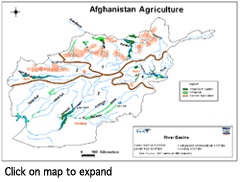 In early 2003, UHL was retained by DAI to develop an overall assessment of groundwater conditions in Afghanistan at large and to assess potential river basins where groundwater might be in a state of overdevelopment. Vincent Uhl traveled to several river basins and interviewed/met with relevant governmental departments and NGOs and United Nations organizations. In early 2003, UHL was retained by DAI to develop an overall assessment of groundwater conditions in Afghanistan at large and to assess potential river basins where groundwater might be in a state of overdevelopment. Vincent Uhl traveled to several river basins and interviewed/met with relevant governmental departments and NGOs and United Nations organizations.
UHL developed an analysis of recharge to the principal aquifer systems in the 5 major river basins and developed the scope for elements of an in-depth analysis of river basins where overdevelopment of groundwater is a concern. A technical scope was also developed for river basins where groundwater is under-utilized and represents a potential source for future irrigation use.
Download
PDF of The Project Report
BACK TO TOP |
| |
|
CLIENT: |
USAID, Chemonics, and
Basic Afghanistan Services (BAS) |
|
PROJECT: |
Groundwater
Assessment for Irrigation Potential |
|
LOCATION: |
Khulm District,
Northern Afghanistan |
|
UHL provided technical assistance to our Afghan associate firm, Basic Afghanistan Services, in conducting a survey of a 300 square kilometer area in an evaluation of the potential for utilizing groundwater for irrigation. Over 60 open wells and drilled wells were inventoried and evaluated for yield and water quality conditions.
The elements of a more comprehensive Phase 2 drilling exploration program were developed for the Client and implemented. Several test wells were installed and tested and a groundwater recharge analysis was completed for a large project area in Northern Afghanistan. UHL provided technical assistance in project development, design, data analysis, and reporting.
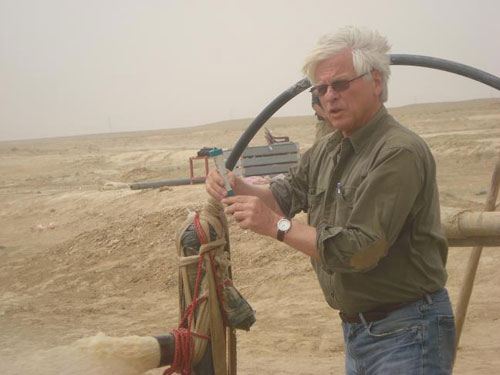
Vince Uhl working in Afghanistan
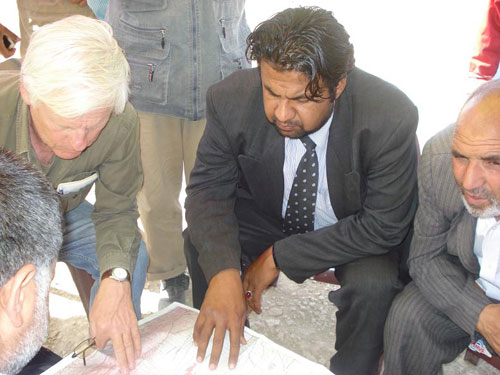
BACK TO TOP |
| |
|
CLIENT: |
USAID and
Louis Berger Group, Inc. |
|
PROJECT: |
Village Water
Supply Assessment |
|
LOCATION: |
Gilan District, Ghazni Province, South- Eastern Afghanistan |
|
In 2003, the Louis Berger Group retained UHL to evaluate the drinking and irrigation water-supply situation in 14 villages in Gilan District of Ghazni Province. These villages were experiencing water supply shortages. UHL coordinated this work with our local partner, Basic Afghanistan Services (BAS), an Afghan NGO specializing in water development and civil engineering.
The principal project objectives were to assess the adequacy of the current water-supply sources (drinking and irrigation) for each village in terms of quantity, quality, and reliability; and inventory the water sources in each village.
Sixty-two (62) karezes; 86 hand-dug wells; and 4 drilled wells were identified in the survey. Traditionally karezes and hand-dug open wells have provided irrigation and drinking water to the 13 villages. The field program documented that many of the karezes and shallow dug wells had gone dry or diminished in yield due to lowering of the water table during an extended four year drought. In the case of the karezes, these water-supply systems are sensitive to long-term droughts as they are essentially skimming water from the top of the saturated zone (water table) and water levels can fall below the bottom of the intake or mother wells during a sustained period of drought.
Similarly, the hand-dug open wells are generally constructed a few meters below the top of the water table and likewise their yields reduce or diminish entirely in a long-term drought.
For villages lacking access to adequate clean drinking water and reduced sources of irrigation water, alternatives were developed to improve water-supply conditions. The technical elements and projected costs were developed for an implementation phase involving new water-supply sources or existing source improvements.
|
Figure 3: Cross-section of a Karez
(Source: "The Warm Desert
Environment" by Andrew Goudie and John Wilkinson,
1977) |
BACK TO TOP |
|
|
CLIENT: |
USAID and Associates in Rural Development (ARD) |
|
PROJECT: |
Groundwater Assessment for Irrigation Potential |
|
LOCATION: |
Bakwa District, Farah Province, Southwest Afghanistan |
|
UHL & Associates and Basic Afghanistan Services (BAS) evaluated groundwater development potential in Bakwa District and portions of Farah District in Farah Province southwestern Afghanistan. The project was carried out and completed in 2009 under the USAID ADP/SW project. The Study was focused on assessing groundwater resource development potential and constraints for irrigation use in Bakwa District and along reaches of the Farah River in Farah District.
The central and southern part of Bakwa District is characterized by productive loess soils that are farmed for wheat and other crops. The Study concluded that there is one principal aquifer unit (conglomerate and sandstone aquifer) in the central and southern parts of Bakwa District that is regional in extent, around 30 meters thick, and with considerable groundwater storage capacity. Well yields from less that 20 lps up to 70 lps have been documented. The aquifer system receives healthy recharge and comprises a renewable resource. Recharge is principally from the infiltration of seasonal surface-water runoff from a number of stream drainages and river systems that head in the mountainous areas to the north, northeast and east of the farmed areas. There are large alluvial fans (some > 100 km2) that are prime groundwater recharge areas.
The conglomerate and sandstone aquifer contains very fresh water (low total dissolved solids or TDS content) in the plain areas in the north, northeast and east District areas. TDS levels show an increase in concentration from these groundwater recharge areas (alluvial fans) to the west-southwest.
The Study confirmed that there are opportunities for irrigation in the District as well as the need for the demonstration of new irrigation technologies and best practices. Technical input and guidance to improve irrigation application efficiency will reduce water usage, allow more hectares to be irrigated and reduce pumping costs. This can be accomplished through demonstration plots on existing farms, and/or new farm developments with improved irrigation techniques and other innovations.
|
Inventory of an Irrigation Well and Field Testing of Water Quality
|
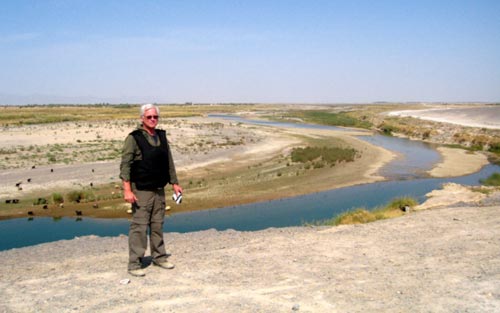 |
Farah River |
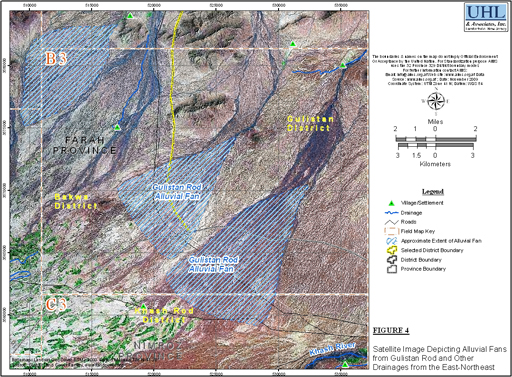
Satellite Image Depicting Alluvial Fans |
Download
PDF of the USAID Report
BACK TO TOP |
|
| BANGLADESH |
CLIENT: |
SAMES and Asian Development Bank (ADB) |
|
PROJECT: |
Khulna WASA - TA 7820: Urban Capacity Building |
|
LOCATION: |
Khulna, Bangladesh |
|
Mr. Uhl was the Project Team Leader for an Asian Development Bank (ADB) Technical Assistance (TA) project to the Khulna Water and Sanitation Authority (KWASA). The project was for pre-loan capacity building and training of KWASA technical and administrative staff in the areas of:
- Utility operations and maintenance.
- Tubewell production operations and management.
- Procurement and contracts.
- Business plan development for the first 5 years.
- Resettlement plan review, and training on resettlement policies and approaches.
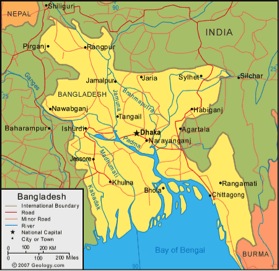
BACK TO TOP |
|
| INDIA |
CLIENT: |
District Towns,
India
|
|
PROJECT: |
Water Supply Development in Betul and Chhindwara Districts, and City of Bhopal
(WASH Programs; Rural and Urban Water Supply; Small Scale Irrigation;
Food Security; Water Quality) |
|
LOCATION: |
Madhya Pradesh, India
|
|
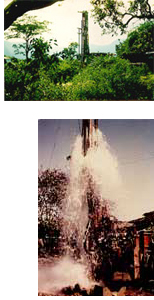 In the early 1970's, Vincent Uhl initiated a groundwater development project in Central India that installed wells and distribution systems for villages, towns, cities, industries and farmers. During his 5 years in India, he was involved with the siting, drilling and testing of over 1,000 wells in areas underlain by sedimentary (sandstone and shale), crystalline, and volcanic bedrock. In the early 1970's, Vincent Uhl initiated a groundwater development project in Central India that installed wells and distribution systems for villages, towns, cities, industries and farmers. During his 5 years in India, he was involved with the siting, drilling and testing of over 1,000 wells in areas underlain by sedimentary (sandstone and shale), crystalline, and volcanic bedrock.
In this timeframe, Mr. Uhl directed groundwater development efforts for Bhopal, the capital city of Madhya Pradesh. This project involved the siting of production well locations through the use of electrical resistivity surveying methods; the installation and testing of 10 production wells in sandstone bedrock and the commissioning of several wells. A total of 1.2 million gallons per day of water was developed in a 2-month time frame as a result of the project.
For the District Town of Betul in Madhya Pradesh, Mr. Uhl directed a project to site, install and test 10 production wells in the underlying granitic rocks. The project resulted in the development of a supplemental source of I million gallons per day over a 2-month period.
During his tenure as the Project Manager, Mr. UhI also directed several
emergency water-supply efforts for towns and villages in the region and country. The
day-to-day operations of the project involved well siting through
the use of surface geophysical techniques, well installation, aquifer
testing, pump installation and maintenance, and water quality testing
and analysis.
BACK TO TOP |
|
| PAKISTAN |
CLIENT: |
WorldWater
Pakistan
|
|
PROJECT: |
Cholistan Groundwater Feasibility Analysis
|
|
LOCATION: |
Southeastern Punjab Province - Cholistan Desert, Pakistan
|
|
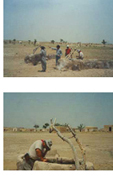 The Cholistan Desert in Southeastern Punjab Province relies entirely on deep hand-dug open wells for drinking and livestock water supply. Water quality is almost entirely brackish to saline in the 120+ villages in this region. UHL visited the area in 2000, inventoried and sampled a selected subset of existing water supply sources, and through a review of existing reports and documents developed the elements of an exploration program to investigate deeper aquifer systems in the region. The Cholistan Desert in Southeastern Punjab Province relies entirely on deep hand-dug open wells for drinking and livestock water supply. Water quality is almost entirely brackish to saline in the 120+ villages in this region. UHL visited the area in 2000, inventoried and sampled a selected subset of existing water supply sources, and through a review of existing reports and documents developed the elements of an exploration program to investigate deeper aquifer systems in the region.
BACK TO TOP |
|
| PHILIPPINES |
CLIENT: |
Bohol Water
Company, Inc. |
|
PROJECT: |
Bohol Municipalities Evaluation
(Small Town and Urban Water Supply Evaluation; Groundwater Sustainability; Water Quality) |
|
LOCATION: |
Bohol, Philippines
|
|
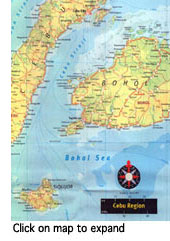 In 2001, UHL conducted a project to assess the feasibility of utilizing groundwater as a sustainable source of public water supply for ten municipalities in the Province of Bohol in the central part of the Philippines. Our client, Bohol Water Company, Inc., was investigating the potential to be the bulk water supplier to these ten municipalities near the capital city of Tagbilaran. Eight of the municipalities are located on the main island of Bohol, and two on nearby Panglao Island with an area of 91 km2. In 2001, UHL conducted a project to assess the feasibility of utilizing groundwater as a sustainable source of public water supply for ten municipalities in the Province of Bohol in the central part of the Philippines. Our client, Bohol Water Company, Inc., was investigating the potential to be the bulk water supplier to these ten municipalities near the capital city of Tagbilaran. Eight of the municipalities are located on the main island of Bohol, and two on nearby Panglao Island with an area of 91 km2.
The study included the following tasks:
- An inventory of current sources of water supply (wells and springs) for the ten municipalities and developing recommendations for future usage.
- Evaluating the sustainability of the underlying aquifer systems for long-term supply until the year 2020 and identifying potential development constraints.
- Developing recommendations for a Phase 2 groundwater exploration program.
- Outlining preliminary development costs to meet the projected year 2005 water demand.
Our study and analysis showed that on the main island of Bohol, there is an abundance of developable groundwater from either wells or springs to meet present and long-term future demands. On Panglao Island, where growth is projected to increase substantially, the groundwater resource is more limited and development should be carefully planned and executed.
Download PDF of Case Study (The Springs of Bohol Province)
BACK TO TOP |
| |
|
CLIENT: |
U.S. Trade and Development
Agency / WorldWater Corporation |
|
PROJECT: |
Rural Water Supply Assessment
(Rural Water Supply; Alternative Energy Sources; Social Surveys) |
|
LOCATION: |
Cebu Province,
Philippines |
|
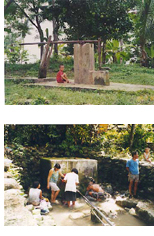 Cebu Province, one of the most densely inhabited islands in the Philippines, with an estimated population of 3,000,000, is comprised of 48 municipalities and 1,172 barangays (rural communities). Approximately half of the island’s population lives in rural areas. Rural population densities are between 200 and 400 people per square kilometer. Potable water supply in these rural areas is predominantly from hand-dug open wells and unprotected springs. Cebu Province, one of the most densely inhabited islands in the Philippines, with an estimated population of 3,000,000, is comprised of 48 municipalities and 1,172 barangays (rural communities). Approximately half of the island’s population lives in rural areas. Rural population densities are between 200 and 400 people per square kilometer. Potable water supply in these rural areas is predominantly from hand-dug open wells and unprotected springs.
UHL, in conjunction with WorldWater Philippines, conducted an assessment of water-supply conditions in the island’s rural communities. Field surveys were conducted to locate, inventory and evaluate existing water sources. Additionally, social surveys were performed by local Filipino scientists to assess current population and health concerns in the rural communities. The study evaluated the feasibility of developing protected sources of water and of applying solar technology for supply, treatment and distribution for areas lacking electricity.
BACK TO TOP |
| |
|
CLIENT: |
Sulu Provincial
Government
|
|
PROJECT: |
Hydrogeologic
Assessment for Water Supply Development
|
|
LOCATION: |
Sulu Province, Philippines
|
|
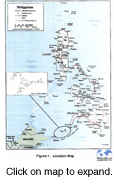 Sulu Province, located in the southwest Philippines, consists of three island groups with a total land area of 1,679 km2. The province has a population of about 540,000, with most people living in rural areas. This rural population relies predominantly on unprotected, hand-dug open wells for drinking water supply. Sulu Province, located in the southwest Philippines, consists of three island groups with a total land area of 1,679 km2. The province has a population of about 540,000, with most people living in rural areas. This rural population relies predominantly on unprotected, hand-dug open wells for drinking water supply.
UHL, in conjunction with WorldWater Philippines, conducted an assessment of the current water-supply source conditions in the Province, evaluated current and projected water supply needs, assessed hydrogeologic conditions, and evaluated the feasibility of developing protected sources of water for areas and villages in need. Recommendations for a phased implementation approach were made to the provincial government with the goal of reaching full capacity within the rural areas in a 5-year time frame.
BACK TO TOP |
|
|

![]() T: +1 (609) 947-1703
T: +1 (609) 947-1703